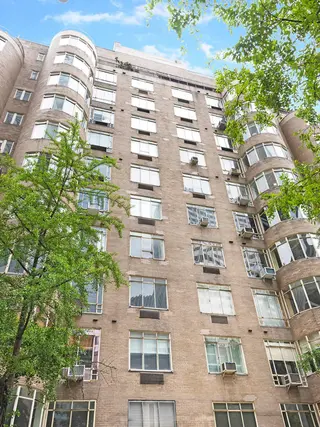 Carter Horsley
Carter HorsleyDec 23, 2011
Carter's Review
Erected in 1936 on the former site of the townhouse of John D. Rockefeller Sr., this through-block project is notable for its large, curved bay windows and its large garden.
Designed by Wallace K. Harrison, a favorite architect of the Rockefellers, and J. Andr¿ Fouilhoux, the development achieved a fame that exceeded their relatively modest designs in large part because of the Rockefeller name and the prime midtown location.
John D. Rockefeller Sr. originally planned only to renovate his townhouse, but, according to Robert A. M. Stern, Gregory Gilmartin and Thomas Mellins in their book, "New York 1930 Architecture and Urbanism Between The Two World Wars," Rizzoli, 1987, "gradually the undertaking grew into a full-scale project providing two twelve-story buildings that represented an important breakthrough on a number of counts: the Rockefeller Apartments filled a five-year-old void in middle-class apartment house construction in midtown, and at the same time introduced a new elegance to efficiently, organized, modestly scaled accommodations and demonstrated that nonhistorical architecture need not necessarily be harsh and mechanistic."
"The glass-enclosed bays were the most dramatic feature of the design, elevating the breakfast nook or 'dinette' to high art. In addition to the community garden separating the buildings, rooftop sun decks, a playroom, and a drugstore on Fifty-fifth Street were provided for the tenants' convenience. Wood-burning fireplaces were built into each living room," the authors noted.
When the project was published in the Architecture Forum, the journal's editors wryly observed, "As modern architecture, the Rockefeller Apartments stand in a rather lonely position. They have nothing in common with the modern tenements going up by the dozens on the city's fringes, no horizontal or vertical 'treatments,' no corner windows staring into other corner windows, none of the idiocies created in the name of a new style. Here is sound building architecture which carries conviction." Lewis Mumford was ecstatic in his praise: the Rockefeller Apartments were "surely the most brilliant and most successful example of modern architecture in the city - at least in apartment houses," a refreshing advance over the stylistic "clich¿s of the international style...When the windows are open up and down the façade," he rhapsodized, 'the effect is like a sudden whirring of birds' wings out of a tree. And if anyone wants to know what is modern ornament, that's what it is - something built for use, which suddenly, when it hits you at the right angle, begins to sing like the four-and-twenty blackbirds,'' the 'New York 1930' authors continued.
The cylindrical columns of large bay windows, four on each street, are indeed very handsome, and clearly influenced the design many years later of the large Corinthian apartment building on 38th Street between First and Second Avenues. The project would be just as impressive even if it did not extend through the block, but the communal garden is very nice and visible from the street through the canopied entrances.
It is remarkable that the beige-colored masonry project was not more influential, especially since it was not an especially expensive development and its detailing is sparse. As a midblock, mid-rise design, it is very attractive even when the blackbirds are not whirring.

- Co-op built in 1936
- 2 apartments currently for sale ($900K to $1.895M)
- Located in Midtown West
- 138 total apartments 138 total apartments
- 10 recent sales ($425K to $988.1K)
- Doorman
- Pets Allowed
 6sqft delivers the latest on real estate, architecture, and design, straight from New York City.
6sqft delivers the latest on real estate, architecture, and design, straight from New York City.
